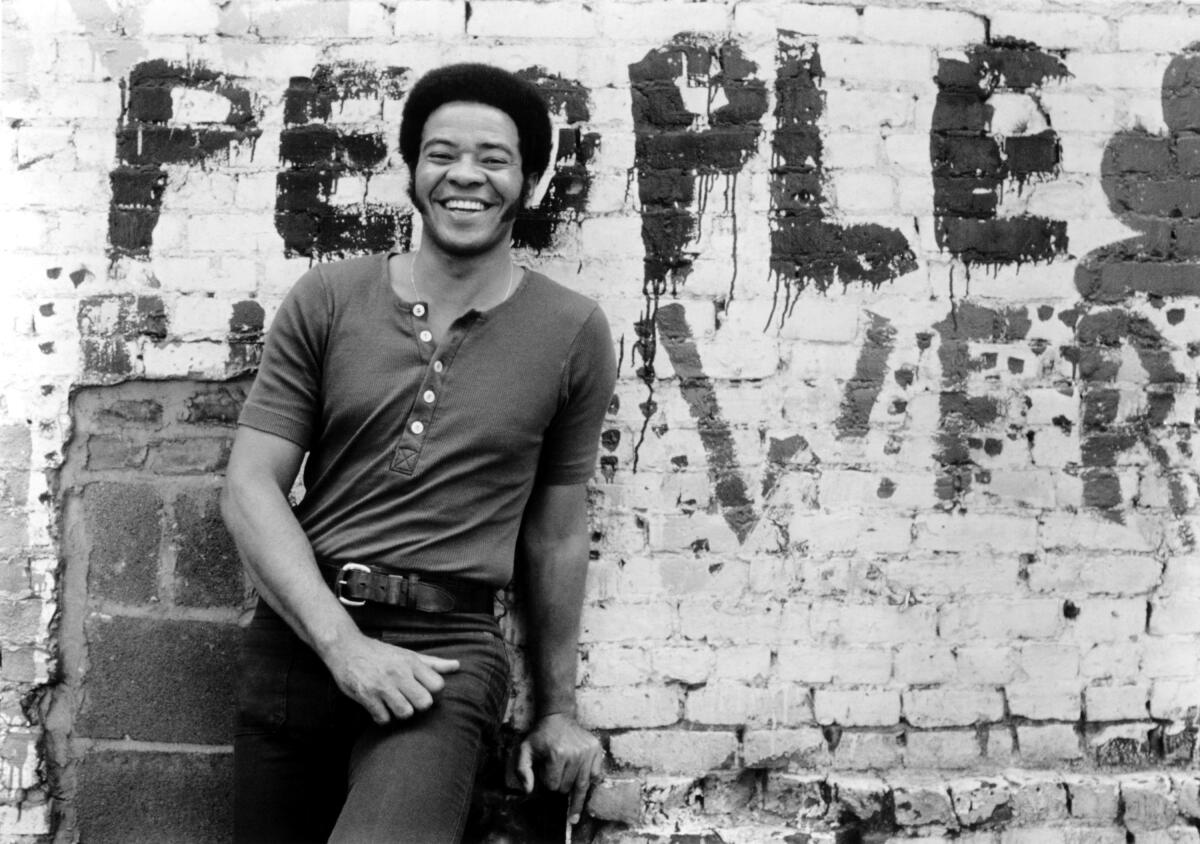Bill Withers, ‘Lean on Me’ and ‘Ain’t No Sunshine’ singer-songwriter, dies at 81

Singer-songwriter Bill Withers, who came to music late and left it early but created enduring hits such as “Ain’t No Sunshine,” “Lean on Me” and “Just the Two of Us,” died in Los Angeles from heart complications March 30, according to an announcement from his family. He was 81.
“We are devastated by the loss of our beloved, devoted husband and father. A solitary man with a heart driven to connect to the world at large, with his poetry and music, he spoke honestly to people and connected them to each other,” the family statement read. “As private a life as he lived close to intimate family and friends, his music forever belongs to the world. In this difficult time, we pray his music offers comfort and entertainment as fans hold tight to loved ones.”

Withers was born July 4, 1938 (“that makes me very American,” he joked), in the coal-mining town of Slab Fork, W.Va., and always made a point of emphasizing his working-class origins and sympathies. A stuttering, socially awkward teenager, he joined the Navy after high school, becoming an aircraft mechanic.
After nine years in the military, he moved to California and got interested in music as a way to meet women, so he bought his first guitar and learned to play it. His first single, “Three Nights and a Morning,” came out in 1967 and made no commercial impact at all. (Later, he would rerecord it as “Harlem.”)
The latest updates from our reporters in California and around the world
In 1971, the independent record label Sussex released Withers’ debut album, “Just As I Am,” on which he was backed by Stephen Stills and members of Booker T. & the M.G.’s. The cover photograph showed Withers in jeans and T-shirt, leaning against the Weber Aircraft factory where he worked at the time, holding his lunchbox; with characteristic prudence, he didn’t give up his job at the factory until it laid him off shortly before the album appeared.
A folk-soul landmark, “Just As I Am” was built around Withers’ calm, supple baritone voice and acoustic guitar. “Ain’t No Sunshine,” his first hit, was a quiet thunderbolt: a plain-spoken and devastating love song, barely two minutes long, with a break in which Withers simply sang “I know” 26 times in a row over Al Jackson Jr.’s skeletal drums. It became an instant standard. So did its follow-up, “Grandma’s Hands,” a sentimental memory with genuine, sharp pain, and the cadences of black churches and the gospel songs he’d heard there as a child beneath its surface.
As a songwriter, Withers built on the traditions of Thomas Dorsey, Hank Williams and Irving Berlin, distilling overwhelming emotions to thoughtful, aphoristic phrases. “To me,” he told Songfacts in 2004, “the biggest challenge in the world is to take anything that’s complicated and make it simple so it can be understood by the masses. ... I’m a stickler for saying something the simplest possible way with some elements of poetry. Because simple is memorable.”
As his musical career was taking off, Withers bought a Wurlitzer electric piano — he hadn’t really played that before, either — and promptly came up with the rising-and-falling melody at the center of “Lean on Me,” which topped both the pop and R&B charts in 1972. The album on which it appeared, “Still Bill,” also produced the slinky funk hit “Use Me,” and a triumphant October 1972 Carnegie Hall concert was released as a live album.
Singer-songwriter Bill Withers, who died Monday, was remembered fondly Friday by celebrities who had made his tunes the soundtrack to their memories.
After that, though, Withers’ career and personal life grew more turbulent. His 1973 marriage to “Room 222” actress Denise Nicholas quickly collapsed; they were divorced the next year, and the bitter emotional fallout from the breakup underscored his messy 1974 album “+’Justments.” Sussex Records folded in 1975, and Withers moved to the much larger label Columbia, whose executives’ ideas about what he should be recording clashed with his own. His songwriting left the raw emotion of his earlier work behind, and although the slick, good-mood pop he was making had its moments — 1977’s “Lovely Day” was a substantial hit — his heart clearly wasn’t in it most of the time, which was a problem for an artist who had built his reputation on direct sincerity.
Withers made no albums in the seven years after 1978’s “‘Bout Love,” although he did have one of his biggest hits in 1981: “Just the Two of Us,” a collaboration with smooth jazz saxophonist Grover Washington Jr. And then, after 1985’s forgettable “Watching You Watching Me” album, he was done. He’d become frustrated by the music business, he explained, and because he’d come to it relatively late, it wasn’t the only path he could imagine for himself. As he later told Rolling Stone, “There’s no rule that says your life has to be one thing.”
So he moved on. Withers simply stepped out of the public eye, in a way that seemed unthinkable for a pop star of his caliber. The music business wasn’t entirely done with Withers, though. He won a 1988 Grammy Award for R&B song for the 16-year-old “Lean on Me,” whose cover by Club Nouveau had topped the charts; his old recordings were sampled by artists such as Blackstreet (“No Diggity”), Eminem (“’97 Bonnie and Clyde”) and Kendrick Lamar (“Sing About Me, I’m Dying of Thirst”).
Meanwhile, Withers went his own way, investing in real estate and managing his songwriting catalog. He didn’t eschew publicity altogether — he was the subject of a 2009 documentary, “Still Bill,” and gave a witty speech when he was inducted into the Rock and Roll Hall of Fame in 2015. But aside from a few brief guest appearances on friends’ records and a cover of “(You’ve Been Quite a Doll) Raggedy Ann” on a Little Jimmy Dickens tribute album in 2017, he released no new music in the last 35 years of his life.
“A very famous minister actually called me to find out whether I was dead or not,” Withers told Rolling Stone in 2015. “I said to him, ‘Let me check.’”
Withers is survived by his second wife, Marcia, and their children, Todd and Kori.
More to Read
Start your day right
Sign up for Essential California for the L.A. Times biggest news, features and recommendations in your inbox six days a week.
You may occasionally receive promotional content from the Los Angeles Times.







